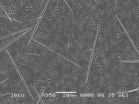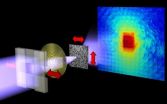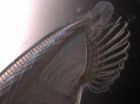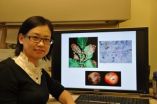People seek high-calorie foods in tough times says University of Miami study
Tough times could trigger bigger waistlines
2013-02-07
(Press-News.org) Bad news about the economy could cause you to pack on the pounds. This according to a new study from the University of Miami School of Business Administration published in the February edition of Psychological Science, a journal of the Association of Psychological Science. The study shows that when there is a perception of tough times, people tend to seek higher-calorie foods that will keep them satisfied longer. When subconsciously primed with such messages, a "live for today" impulse is triggered causing people to consume nearly 40 percent more food than when compared to a control group primed with neutral words.
"The findings of this study come at a time when our country is slowly recovering from the onslaught of negative presidential campaign ads chalked with topics such as the weak economy, gun violence, war, deep political divides, just to name a few problem areas," said Juliano Laran, an assistant professor of marketing at the University of Miami School of Business Administration, who conducted the research with doctoral student Anthony Salerno. "Now that we know this sort of messaging causes people to seek out more calories out of a survival instinct, it would be wise for those looking to kick off a healthier new year to tune out news for a while."
Further, when the same group primed with "tough times" messages was then told the food they were sampling was low-calorie, they consumed roughly 25 percent less of the food. According to the researchers this is because if people perceive that food resources are scarce, they place a higher value on food with more calories.
METHODOLOGY
Several studies were conducted as part of the research. In the first one, the researchers invited study subjects to join in a taste test for a new kind of M&M. Half the participants were given a bowl of the new candy and were told that the secret ingredient was a new, high-calorie chocolate. The other half of the participants also received a bowl of M&Ms but were told the new chocolate was low-calorie. All of the participants were told that they could sample the product in order to complete a taste test evaluation form.
In reality, there was no difference in the M&Ms that the two groups were given to taste. The researchers were actually measuring how much participants consumed after they were exposed to posters containing either neutral sentences or sentences related to struggle and adversity. Those who were subconsciously primed to think about struggle and adversity ate closer to 70 percent more of the "higher-calorie candy" vs. "the lower-calorie" option, while those primed with neutral words did not significantly differ in the amount of M&M's consumed.
"It is clear from the studies that taste was not what caused the reactions, it was a longing for calories," continued Laran. "These findings could have positive implications for individuals in the health care field, government campaigns on nutrition, and companies promoting wellness. And, certainly beware of savvy food marketers bearing bad news."
INFORMATION:
About the University of Miami School of Business Administration
The University of Miami School of Business Administration is a comprehensive business school, offering undergraduate business, full-time MBA, Executive MBA, MS, PhD and non-degree executive education programs. One of 12 colleges and schools at the University of Miami, the School is located in a major hub of international trade and commerce and acclaimed for the global orientation and diversity of its faculty, students and curriculum. The School delivers its programs at its main campus in Coral Gables as well as at locations across Florida and abroad. More information about the University of Miami School of Business Administration can be found at www.bus.miami.edu.
END
ELSE PRESS RELEASES FROM THIS DATE:
2013-02-07
With help from a wind tunnel and the latest DNA technology, U.S. Department of Agriculture (USDA) scientists are shedding light on the travel patterns of microbes in soils carried off by strong winds. The work has implications for soil health and could lead to management practices that minimize the damage to soils caused by wind erosion.
Wind erosion is an emerging issue in soil conservation efforts. Agricultural Research Service (ARS) scientists have been studying wind-eroded soils since the 1930s, but few studies have focused on the effects of wind on the bacteria, ...
2013-02-07
INDIANAPOLIS -- Medical literature long has touted the benefits of omega-3 fatty acids for the heart. But until now, researchers have not studied the potential benefit for people on hemodialysis, who are among the highest-risk patients for sudden cardiac death.
A study published Feb. 6 online in the journal Kidney International, which included 100 patients who died of sudden cardiac death during their first year of hemodialysis and 300 patients who survived, is the first to examine this question.
Allon N. Friedman, M.D., associate professor of medicine in the Division ...
2013-02-07
SAN FRANCISCO, Feb. 6, 2013 -- Nitrogen in ocean waters fuels the growth of two tiny but toxic phytoplankton species that are harmful to marine life and human health, warns a new study published in the Journal of Phycology.
Researchers from San Francisco State University found that nitrogen entering the ocean -- whether through natural processes or pollution -- boosts the growth and toxicity of a group of phytoplankton that can cause the human illness Amnesic Shellfish Poisoning.
Commonly found in marine waters off the North American West Coast, these diatoms (phytoplankton ...
2013-02-07
Since the observations made by English naturalist Charles Darwin on the Galapagos Islands, researchers have been interested in how physical barriers, such as isolation on a particular island, can lead to the formation of new species through the process of natural selection. Natural selection is a process whereby heritable traits that enhance survival become more common in successive generations, while unfavorable heritable traits become less common. Over time, animals and plants that have morphologies or other attributes that enhance their suitability to a particular environment ...
2013-02-07
ANN ARBOR—Hunger, thirst, stress and drugs can create a change in the brain that transforms a repulsive feeling into a strong positive "wanting," a new University of Michigan study indicates.
The research used salt appetite to show how powerful natural mechanisms of brain desires can instantly transform a cue that always predicted a repulsive Dead Sea Salt solution into an eagerly wanted beacon or motivational magnet.
Mike Robinson, a research fellow in the U-M Department of Psychology and the study's lead author, said the findings help explain how related brain activations ...
2013-02-07
AUDIO:
In the 1970s and early 1980s, some states lower their minimum legal drinking age below the age of 21. Those lower drinking ages have been linked to bad things, from...
Click here for more information.
People who grew up in states where it was legal to drink alcohol before age 21 are more likely to be binge drinkers later in life, according to a study by researchers at Washington University School of Medicine in St. Louis.
The findings are available online in Alcoholism: ...
2013-02-07
For more than 100 years radiography meant: don't move! In order to visualize nanostructures such as biological cells, the porous structure of cement or storage fields of magnetic disks, the experimentators had to avoid any kind of vibration of X-ray microscope and sample. In addition, only a small percentage fraction of the incoming X-ray radiation could be used. Using special filters, they had to select exactly the fraction with the right properties – for example, the right wavelength.
Contributions of different wavelengths separated
Pierre Thibault of the Technische ...
2013-02-07
CHICAGO -- Feeding human breast milk to very-low-birth-weight infants greatly reduces risk for sepsis and significantly lowers associated neonatal intensive care unit (NICU) costs, according to a study by Rush University Medical Center researchers.
The study, published Jan. 31 in the advance online version of the Journal of Perinatology, showed that every 10 milliliters of human milk per kilogram that a very low birth weight infant received during the first 28 days of life decreased the odds of sepsis by almost 20 percent.
A daily dose of 25 to 49.99 milliliters of ...
2013-02-07
WOODS HOLE, MASS. -- Among the animals that are appealing "cover models" for scientific journals, lancelets don't spring readily to mind. Slender, limbless, primitive blobs that look pretty much the same end to end, lancelets "are extremely boring. I wouldn't recommend them for a home aquarium," says Enrico Nasi, adjunct senior scientist at the Marine Biological Laboratory (MBL). Yet Nasi and his collaborators managed to land a lancelet on the cover of the Journal of Neuroscience last December. These simple chordates, they discovered, offer insight into our own biological ...
2013-02-07
RIVERSIDE, Calif. — When a pathogen attacks a plant, infection usually follows after the plant's immune system is compromised. A team of researchers at the University of California, Riverside focused on Phytophthora, the pathogen that triggered the Irish Famine of the 19th century by infecting potato plants, and deciphered how it succeeded in crippling the plant's immune system.
The genus Phytophthora contains many notorious pathogens of crops. Phytophthora pathogens cause worldwide losses of more than $6 billion each year on potato (Phytophthora infestans) and about ...
LAST 30 PRESS RELEASES:
[Press-News.org] People seek high-calorie foods in tough times says University of Miami study
Tough times could trigger bigger waistlines




